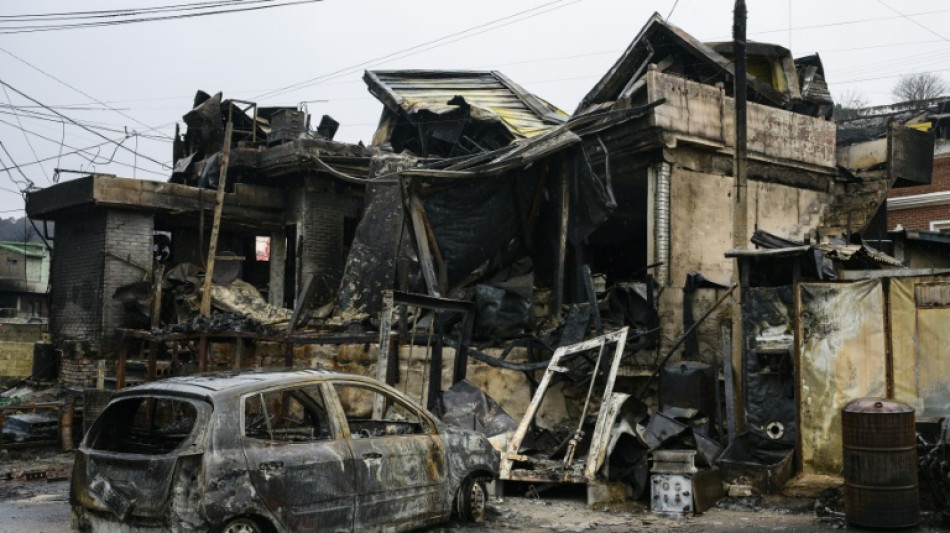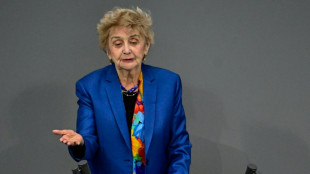
-
 Rockets veteran Adams out for rest of NBA season
Rockets veteran Adams out for rest of NBA season
-
Holders PSG happy to take 'long route' via Champions League play-offs

-
 French Senate adopts bill to return colonial-era art
French Senate adopts bill to return colonial-era art
-
Allrounder Molineux named Australian women's cricket captain

-
 Sabalenka faces Svitolina roadblock in Melbourne final quest
Sabalenka faces Svitolina roadblock in Melbourne final quest
-
Barcelona rout Copenhagen to reach Champions League last 16

-
 Liverpool, Man City and Barcelona ease into Champions League last 16
Liverpool, Man City and Barcelona ease into Champions League last 16
-
Tesla profits tumble on lower EV sales, AI spending surge

-
 Real Madrid face Champions League play-off after Benfica loss
Real Madrid face Champions League play-off after Benfica loss
-
LA mayor urges US to reassure visiting World Cup fans

-
 Madrid condemned to Champions League play-off after Benfica loss
Madrid condemned to Champions League play-off after Benfica loss
-
Meta shares jump on strong earnings report

-
 Haaland ends barren run as Man City reach Champions League last 16
Haaland ends barren run as Man City reach Champions League last 16
-
PSG and Newcastle drop into Champions League play-offs after stalemate

-
 Salah ends drought as Liverpool hit Qarabag for six to reach Champions League last 16
Salah ends drought as Liverpool hit Qarabag for six to reach Champions League last 16
-
Barca rout Copenhagen to reach Champions League last 16

-
 Arsenal complete Champions League clean sweep for top spot
Arsenal complete Champions League clean sweep for top spot
-
Kolo Muani and Solanke send Spurs into Champions League last 16

-
 Bayern inflict Kane-ful Champions League defeat on PSV
Bayern inflict Kane-ful Champions League defeat on PSV
-
Pedro double fires Chelsea into Champions League last 16, dumps out Napoli

-
 US stocks move sideways, shruggging off low-key Fed meeting
US stocks move sideways, shruggging off low-key Fed meeting
-
US capital Washington under fire after massive sewage leak

-
 Anti-immigration protesters force climbdown in Sundance documentary
Anti-immigration protesters force climbdown in Sundance documentary
-
US ambassador says no ICE patrols at Winter Olympics

-
 Norway's Kristoffersen wins Schladming slalom
Norway's Kristoffersen wins Schladming slalom
-
Springsteen releases fiery ode to Minneapolis shooting victims

-
 Brady latest to blast Belichick Hall of Fame snub
Brady latest to blast Belichick Hall of Fame snub
-
Trump battles Minneapolis shooting fallout as agents put on leave

-
 SpaceX eyes IPO timed to planet alignment and Musk birthday: report
SpaceX eyes IPO timed to planet alignment and Musk birthday: report
-
White House, Slovakia deny report on Trump's mental state

-
 Iran vows to resist any US attack, insists ready for nuclear deal
Iran vows to resist any US attack, insists ready for nuclear deal
-
Colombia leader offers talks to end trade war with Ecuador

-
 Former Masters champ Reed returning to PGA Tour from LIV
Former Masters champ Reed returning to PGA Tour from LIV
-
US Fed holds interest rates steady, defying Trump pressure

-
 Norway's McGrath tops first leg of Schladming slalom
Norway's McGrath tops first leg of Schladming slalom
-
Iraq PM candidate Maliki denounces Trump's 'blatant' interference

-
 Neil Young gifts music to Greenland residents for stress relief
Neil Young gifts music to Greenland residents for stress relief
-
Rubio upbeat on Venezuela cooperation but wields stick

-
 'No. 1 fan': Rapper Minaj backs Trump
'No. 1 fan': Rapper Minaj backs Trump
-
Fear in Sicilian town as vast landslide risks widening

-
 'Forced disappearance' probe opened against Colombian cycling star Herrera
'Forced disappearance' probe opened against Colombian cycling star Herrera
-
Seifert, Santner give New Zealand consolation T20 win over India

-
 King Charles III warns world 'going backwards' in climate fight
King Charles III warns world 'going backwards' in climate fight
-
Minneapolis activists track Trump's immigration enforcers

-
 Court orders Dutch to protect Caribbean island from climate change
Court orders Dutch to protect Caribbean island from climate change
-
Sterling agrees Chelsea exit after troubled spell

-
 Rules-based trade with US is 'over': Canada central bank head
Rules-based trade with US is 'over': Canada central bank head
-
Lucas Paqueta signs for Flamengo in record South American deal

-
 Holocaust survivor urges German MPs to tackle resurgent antisemitism
Holocaust survivor urges German MPs to tackle resurgent antisemitism
-
'Extraordinary' trove of ancient species found in China quarry


Climate change made fire conditions twice as likely in South Korea blazes: study
Human-induced climate change made the ultra-dry and warm conditions that fanned South Korea's deadliest wildfires in history this March twice as likely and more intense, researchers said Thursday.
Vast swaths of the country's southeast were burned in a series of blazes in March, which killed 31 people and destroyed historic sites, including a some thousand-year-old temple site.
The affected area had been experiencing below-average rainfall for months and was then hit by strong winds, local officials said, following South Korea's hottest year on record in 2024.
The hot, dry and windy conditions that fed the flames were "twice as likely and about 15 percent more intense" due to human-caused climate change, said World Weather Attribution, a scientific network that studies the influence of global warming on extreme weather.
"South Korea's deadliest wildfires were made much more likely by climate change," said Clair Barnes, a WWA researcher from the Centre for Environmental Policy, Imperial College London.
Officials said at the time that the conditions made it very hard for conventional firefighting methods to control the blazes, which leapt from pine tree to pine tree across dried-out hillsides.
"These unprecedented conditions exposed the limits of even well-developed suppression systems," WWA said in a report of its findings.
"With fires increasingly likely to exceed control capacity, the emphasis must shift toward proactive risk reduction," it added.
More than 62 percent of South Korea is covered in forest, the report said, with dense tree cover especially prominent along the eastern coast and in mountainous regions, landscapes that significantly influence how wildfires spread.
Around 11 percent of South Korea's forested areas border human settlements, the study said.
"These areas are particularly susceptible to ignition and have accounted for nearly 30 percent of wildfires recorded between 2016 and 2022."
The researchers' findings were most conclusive regarding the increased likelihood of fire weather -- which is measured by the Hot-Dry-Windy Index (HDWI) -- and higher maximum temperatures.
But they found no attributable link between climate change and rainfall levels during the period surrounding the fires.
- Fires rage -
South Korea has few energy resources of its own and relies on imported coal -- a cheap but dirty fuel -- for around a third of the electricity powering it, according to figures from the International Energy Agency.
The inferno in March also laid bare the country's demographic crisis and regional disparities, as rural areas are both underpopulated and disproportionately home to senior citizens.
Many of the dead were seniors, and experts have warned that it will be hard for people to rebuild their lives in the burn zone.
In the weeks and months since, South Korea has recorded a string of wildfires.
In April, helicopters were deployed to contain a wildfire within the DMZ, the buffer zone separating the South from nuclear-armed North Korea.
This week, more than 2,000 people were forced to evacuate after wildfires occurred in parts of the southeastern city of Daegu, after a blaze broke out on Mount Hamji in the region.
WWA is a pioneer in attribution science, which uses peer-reviewed methods to quickly assess the possible influence of climate change on extreme weather events.
This allows a comparison of observations from today's climate, with some 1.3 degrees Celsius of warming, against computer simulations that consider the climate before humanity started burning fossil fuels in the 1800s.
K.Hofmann--VB



